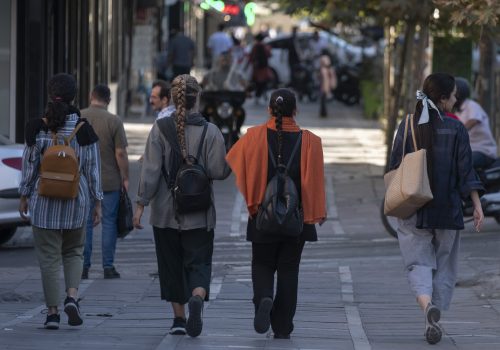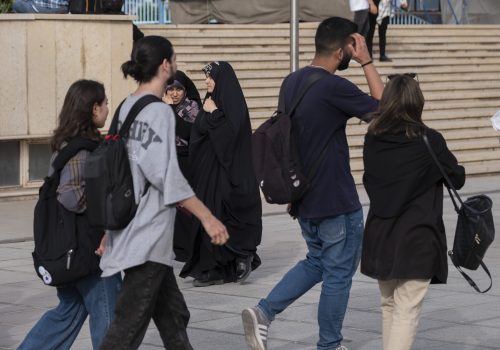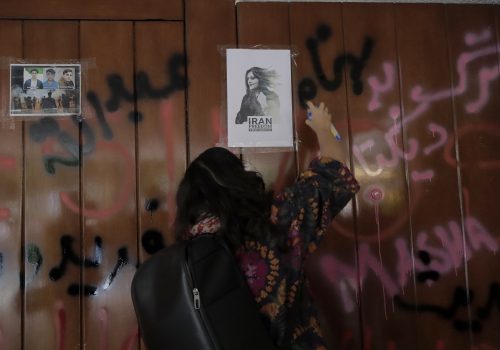Iranians sacrificed their lives to share videos of regime violence. Now there’s an online archive for the world to see.
My radio alarm clock woke me up on June 12, 2009 to the news that millions of Iranians had taken to the streets to protest the fraudulent outcome of the presidential election. I listened momentarily, rolled over, and hit the snooze button.
When I got to work at my information technology (IT) job that day, I read news about the protests that became known as the Green Movement, prompted by the sham reelection of hardliner President Mahmoud Ahmadinejad. For weeks, Iranians poured into the streets of major cities wearing green—the color of reformist candidate Mir Hossein Mousavi—and chanting and holding signs that read, “Where is my vote?”
At the time, the Atlantic called it “the first major world event broadcast almost entirely via social media.” Caught by surprise, the clerical establishment scrambled to censor the internet by blocking websites or deliberately slowing connection speed. It was a historical moment and showed that the internet could be a medium of hope for dramatic social and political change.
As a young Iranian-American man struggling with his half-Iranian identity after growing up with the anti-Iranian hate crimes and discrimination of the 1980s, the protests were a lightning bolt to my heart. People who looked like me were not chanting, “Death to America,” but instead calling for democratic values that I held dear—ones that were in my Iranian immigrant father’s heart as he fled to the United States after the 1979 revolution with my pregnant American mother. The Green Movement changed how I saw myself, and I felt a deep call to get involved in the Iranian people’s quest for freedom. That is why in 2009 I helped co-found Access Now, one of the largest human rights organizations dedicated to defending digital rights.
SIGN UP FOR THIS WEEK IN THE MIDEAST NEWSLETTER
During the Green Movement, I quickly learned how to develop and distribute proxy servers to allow Iranians uncensored internet access to tell their stories. This work gathered a group of young activists to support the protestors with whatever tools and expertise they needed, and required shifts of eighteen hours per day. The servers were used by tens of thousands of Iranians daily, and websites that were defended from being taken down by the regime—reaching five million Iranians per day, or more than 25 percent of the entire country’s internet users—were the main news sources for Western media outlets covering the ongoing protests. Tools were developed to defend hundreds of key journalists and activists inside Iran sharing news and video. These elements became the foundations of Access Now.
But one project stayed close to my heart: video archiving. The clerical establishment was trying to erase protest videos, while activists were removing videos for fear of persecution. History was being erased as quickly as it was being made. In response, I downloaded thousands of videos filled with violence, hope, tears, and joy, which were converted to mobile formats and redistributed across the country, where they were downloaded by more than three million Iranians.
In 2022, when Mahsa Amini was murdered by the so-called morality police for “violating” mandatory hijab rules, I gathered a small group of colleagues and friends and together we downloaded thousands of videos to ensure that the Women, Life, Freedom uprising led by women would not be erased. This became the Azadi (freedom) Archive, created in September 2022 and later joined by an international archival coalition led by the Atlantic Council’s Strategic Litigation Project and Mnemonic, with the Promise Institute for Human Rights at the University of California, Los Angeles (UCLA) Law, the University of California, Berkeley’s Human Rights Center, Amnesty International’s Digital Verification Corps, and the Iran Human Rights Documentation Center.
The newly renamed Iranian Archive now holds more than one million videos and contributed to the investigation carried out by the United Nations Independent International Fact-Finding Mission on the Islamic Republic of Iran (FFMI), which unveiled a report in March detailing how the Islamic Republic committed crimes against humanity and other serious human rights violations against Woman, Life, Freedom protesters. On March 21, the United Nations Human Rights Council voted to renew the mandate of the FFMI, giving it more time to strengthen its significant findings and ensure the effective preservation of evidence for use in legal proceedings, including the significant photo and video shared throughout the protests.
The world’s tragedies deserve justice and to be remembered. Iranians who risked their lives to share images of protest violence did so with the hope that information would get out and the world would respond to the Islamic Republic’s atrocious human rights violations. Even now, thousands of videos are uploaded by brave activists from around the globe every day—but without a systematic and funded approach to preservation, the opportunities for accountability, remembering, research, and memorialization are lost.
The global coalition of universities, nonprofits, and companies committed to archiving and preserving videos is making that vision a reality by working together through the nonprofit Iranian Archive to preemptively capture, store, catalog, and tag digital content in a way that can be used by researchers, lawyers, and human rights defenders in the future.
The birth of this global archival coalition signals to Iranian activists and citizen journalists that their sacrifice to share information with the world will not be erased online. It also upholds the best that the internet has to offer, despite increasing “enshittification,” and makes a meaningful contribution to social justice and human rights online and offline.
It’s been fifteen years since the international community realized the importance of digital activism due to the 2009 Green Movement. It must not wait another fifteen years before it develops a robust and comprehensive approach to archiving and preserving video to support justice and human rights movements across the world.
Cameran Ashraf is co-founder of international human rights and technology organization AccessNow, human rights scholar, and NGO human rights leader.
Further reading
Wed, Sep 13, 2023
Letters from women protesters inside Iran: One year after #MahsaAmini’s death
IranSource By
"The people of Iran want to overthrow this regime. If you believe in freedom, equality, and human rights, remember that this regime stands against these values."
Fri, Sep 8, 2023
Iran will never go back to the way it was
IranSource By Holly Dagres
While some argue that the ongoing anti-establishment protests began in mid-September 2022, the reality is that Iranians have been defying the regime for years.
Wed, Sep 28, 2022
I’m a member of Gen Z from Tehran. World, please be the voice of the people of Iran.
IranSource By
To all the brave and beautiful people out there who know what freedom feels like, be our voice.
Image: A man gestures during a protest over the death of Mahsa Amini, a woman who died after being arrested by the Islamic republic's "morality police", in Tehran, Iran September 19, 2022. WANA (West Asia News Agency) via REUTERS


